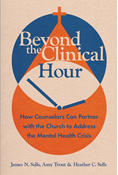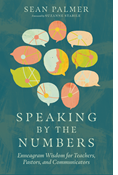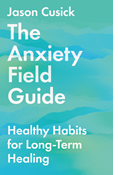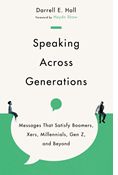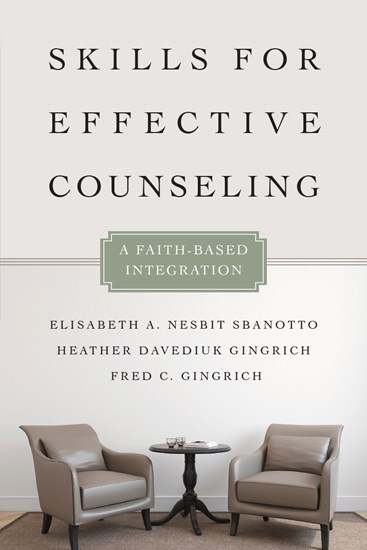
|
Skills for Effective Counseling
paperback
|
- Length: 486 pages
- Dimensions: 7 × 10 in
- Published: September 14, 2016
- Imprint: IVP Academic
- Item Code: 2860
- ISBN: 9780830828609
-
Other Retailers:
Amazon*
*affiliate partner
Anyone in a helping profession—including professional counselors, spiritual directors, pastoral counselors, chaplains and others—needs to develop effective communication skills. But learning these skills is like learning a new language: it takes time and practice to communicate effectively, and lack of practice can lead to the loss of one's ability to use this new language.
Suitable for both beginning students and seasoned practitioners, Skills for Effective Counseling provides a biblically integrated approach to foundational counseling skills that trains the reader to use specific microskills. These skills include perceiving, attending, validating emotion and empathic connection.
Chapters include textbook features such as sample session dialogues, role plays and a variety of both in-class and out-of-class exercises and reflection activities that will engage various learning styles. Strategically interwoven throughout the chapters are special topics related to:
- multicultural counseling
- biblical/theological applications
- current and seminal research related to microskills
- diagnostic and theoretical implications
- clinical tips for using skills in "real world" counseling settings
- the relevance of specific microskills to interpersonal relationships and broader ministry settings
This textbook and the accompanying IVP Instructor Resources include all of the activities and assignments that an instructor might need to execute a graduate, undergraduate or lay course in foundational counseling skills. Professors teaching within CACREP-accredited professional counseling programs will be able to connect specific material in the textbook to the latest CACREP Standards.
Christian Association for Psychological Studies (CAPS) Books explore how Christianity relates to mental health and behavioral sciences including psychology, counseling, social work, and marriage and family therapy in order to equip Christian clinicians to support the well-being of their clients.
"Professionals often zero in on disciplinary differences in approach, but in this excellent text Elisabeth Nesbit Sbanotto, Heather Davediuk Gingrich, and Fred C. Gingrich transcend disciplinary differences and get to the heart of being a better people-helper—the interpersonal helping skills shared across people-helping disciplines. This is a comprehensive, readable text that is a fully integrated Christian and psychological model for being an effective helper. Regardless of your discipline or theoretical approach you'll love it."
"Every day I look for resources that will help me and others become more effective in helping counsel and minister to others. Whether you are a beginning student, seasoned clinician, or pastor, Skills for Effective Counseling is a must-add to your library. It is clinically excellent, biblically anchored, and easy to understand yet filled with immense wisdom and understanding."
"Wow. What a delightful surprise. This biblically sound, research-based, therapeutically relevant, and easy-to-read book is a unique, fresh, rich, integrative, and practical resource. Regardless of your therapeutic orientation, you'll find some practical tools to help you to become even more effective. It's a breath of fresh air for the practicing clinician and will be a resource that you'll turn to often. There are several chapters alone that are worth the price of the book. If you want to upgrade your therapeutic toolkit and increase both your confidence and effectiveness, read this book. It's that good."
"Skills for Effective Counseling is well written, comprehensive, and very helpful for training counseling skills, covering essential microskills with the integration of Christian faith and counseling. This is a much-needed book for the effective training of Christian professional counselors as well as lay counselors. Highly recommended!"
"Finally! We have been given a competent textbook that tackles the need for training graduate students in skills for effective counseling that also addresses faith-based integration. Sbanotto, Gingrich, and Gingrich have given us an excellent tool to understand the relationship of faith-based counseling to secular approaches in a way that will guide us in effective helping processes with those of varied spiritual beliefs."
"Skills for Effective Counseling is a comprehensive yet accessible textbook written from decades of professional practice by the authors. It is for people helpers across a variety of roles—professional counselors, pastoral care providers, spiritual directors, and life coaches—and features a wealth of training activities, exercises, and transcript analysis. This is a welcome addition to the counselor education fields."
"Skills for Effective Counseling strives to equip a new generation with listening skills and a constructive framework to counsel with love in service of Jesus Christ. Forty years ago, Gary R. Collins demystified counseling and connected basic helping principles with Christian discipleship in How to Be a People Helper. In Skills for Effective Counseling, Sbanotto, Gingrich, and Gingrich honor the heart of that pioneering quest. This is a foundational text that is accessible, intentional, integrative, systematic, and reflective. It is accessible in that it is multiculturally aware, jargon free, and adaptable to ministry. The intentional design to promote quality-helping encounters is evident in its sequential approach, dialogue samples, and plentiful learning activities. The faith-integrative component is found in comparative tables and discussion. Contemporary counseling links to Christian soul care. Each chapter systematically bridges pivotal empirical findings with elevated conversation. The reader is shown how to increase communication habits that deepen interpersonal relationships and motivate growth. There are countless opportunities for self-reflection with scales to obtain insightful feedback. This book unfolds a helping process that is realistic, hopeful, and, most importantly, biblically faithful. Finally, a faith-sensitive, microskills text for the next generation of people helpers."
"This book combines clarity and reader-friendliness with an academically solid, up-to-date approach to counseling skills. Unusual in drawing on the three perspectives of its authors (a counselor, a marriage and family therapist, and a psychologist), it will be a great text for students and a wonderful resource for practitioners, whatever their people-helping role—including pastors and other church-based workers. The Christian integrative perspective is woven throughout, as well as having its own chapter. A chapter on the systems perspective—rare in such counseling skills books—is an important, welcome addition."
CONTENTS
List of Figures and Tables
Introduction
1. The Microskills Approach
Skill: The Skill of Learning New Skills
Skill: Identifying Targeted Skill Areas
2. The Person of the Counselor
Skill: Self-as-instrument
Target 1: Establishing Relationship and Exploring
3. What Do You Notice?
Skill: Perceiving
4. Your Presence in the Room
Skill: Attending
5. Identifying the Pieces of the Story
Skill: Reflecting Content
6. Validating Emotion
Skill: Reflecting Feeling
7. Connecting Empathically
Skill: Empathic Reflection
Targets 2 and 3: Deepening and Growing
8. Zeroing In
Skill: Clarifying
9. Connecting Deeply
Skill: Intuitive Empathy
10. Expanding Therapeutic Options
Skill: Using Metaphors
11. Reflecting Apparent Discrepancies
Skill: Confronting
12. Using the Here and Now
Skill: Authenticity, Self-disclosure and Immediacy
13. Strategies for Growth
Skill: Implementing Change
14. Expanding the Counseling System
Skill:Thinking Systemically and Using the Relational System
15. Appreciating the Sacred
Skill: Attuning to the Holy Spirit and Spiritual Themes
Target 4: Consolidating and Ending
16. Endings and New Beginnings
Skill: Consolidating and Ending
Postscript
Appendix A: Answers to Chapter Exercises
Appendix B: Additional Learning Activities
Appendix C: Small Group Role-Play Exercises and Transcript Analysis Assignment
Appendix D: The Relationship Between Psychology and Religion
References
Author and Subject Index
Scripture Index




